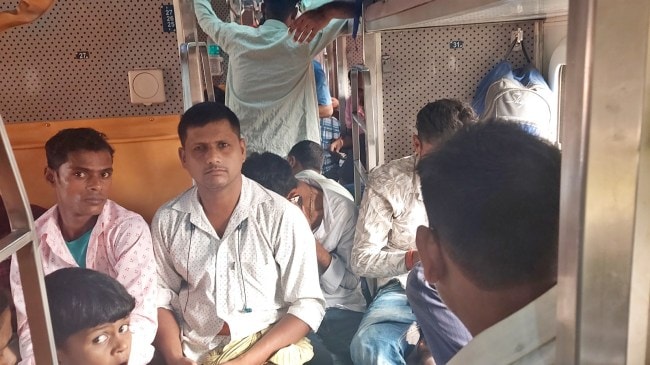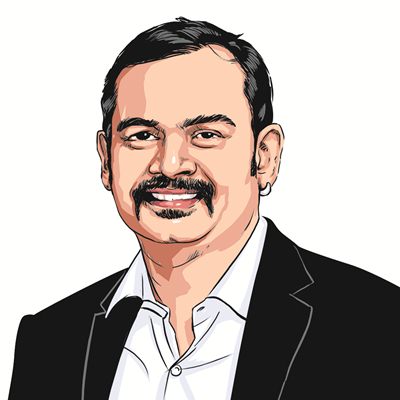Jobs, palayan, and the weight of being a Bihari: Aboard a train full of migrants going home for Chhath Puja
The Indian Express hops on to the Amrit Bharat Express, packed to the brim, and listens in as the passengers discuss their hopes, frustrations, and the Assembly elections.
 Passengers in the S2 coach of the train.
Passengers in the S2 coach of the train. The Amrit Bharat Express that leaves Delhi’s Anand Vihar station in the afternoon and arrives in Motihari in Bihar the next morning is packed to the brim. Every year, as Chhath Puja nears, trains headed east overflow with migrants returning home. This one is no exception.
In the sleeper coach, it takes nearly 15 minutes to push through the narrow aisle to the berth. Sacks, suitcases, plastic buckets, cardboard boxes filled with pressure cookers, and utensils lie strewn around. The only way to move luggage is to balance it on the head and squeeze sideways.
In the compartment where this reporter has a reservation, 15 adults and seven children share eight seats. The floor and berths are cluttered with bags and new purchases — mixies, dinner sets, blankets — all gifts to take home. Some passengers have no option but to stand through the night. Yet, there isn’t a word of complaint. “Arey kono baat naikhe, sab kehu adjust ho jai. Chhath ba (This is no problem, we can adjust to anything, this is Chhath after all),” a man says cheerfully, giving up his berth for the children.
 Passengers huddled near the toilet
Passengers huddled near the toilet
As the train pulls out, the chatter begins: about how impossible it is to get a ticket home, not just during Chhath but through the year. That soon turns into grumbling about the filthy condition of trains. However, the blame falls not on the Railways, but passengers themselves. “Stuff a train with Biharis and they’ll make it dirty,” a man jokes. “The dirtiest trains are the ones going to Bihar.” His friend nods. “And Chirag Paswan keeps saying ‘Bihar First, Bihari First’. First teach Biharis some civic sense.”
The jokes have an edge. They come from a place of shame, not arrogance. Beneath the laughter runs the shared knowledge of palayan, migration, the word that defines modern Bihar and now shapes its politics.
Sitting on the floor near a toilet between a coach and the pantry car are Ramesh Sah, a Bania (OBC) by caste, and Ravikant Pandit, a Kumhar Prajapati (EBC), both in their fifties and both from Chiraiya in Motihari. They work in Haryana and are on their way home for the festival.
“What has any government done for people like us?” asks Sah. “If they had, I wouldn’t be sitting between two coaches like this. Governments will come and go, and will keep travelling like this.”
 Passengers huddled near the toilet
Passengers huddled near the toilet
Pandit nods, “Everything in Bihar is good. Only migration is the big problem. No party has solved it, no party will. You need a leader like Yogi Adityanath who does what he says.”
In another coach, 25-year-old Vijay Thakur, who works as a barber in Gurgaon, sits on the floor near a toilet. For him, migration is not a political failure but a social one. “My brothers migrated in the 2000s, then I joined them. The problem isn’t politicians, it’s us. We can’t rise above caste, so no leader feels the need to change anything.”
Between coaches S2 and S3, two young men stand clutching their bags. Mohammed Jehangir and Saheb Alam, marble polishers in Delhi, are from Awasani in West Champaran. They have been working outside Bihar since 2014. “There are no jobs at home. I have six brothers, all in different cities,” says Jehangir.
More than the physical hardship, what weighs heavily are the slights they face for being a Bihari in another state. Mukesh Sah, a 30-year-old auto driver from Piprakothi in Motihari, sits in the aisle and is forced to get up every time someone heads to the bathroom. “I live with four others in one small room near Kailash Colony (in Delhi). In my village, I wouldn’t tie my buffalo in that space. But the landlord earns lakhs just because he was born in the right place.”
 Ramesh Sah and Ravikant Pandit
Ramesh Sah and Ravikant Pandit
He pauses as another passenger squeezes past him. “Ask anyone in this train how we’re treated in Delhi. ‘Bihari’ is used as an abuse. But we bear it for our families.”
When someone jokes that he can soon go home faster on a bullet train. Mukesh laughs. “Bullet train? We’ll still be sitting in the aisle! No one, (PM) Modi or Nitish (CM Nitish Kumar), has done anything for migrants. That’s why people want change now. Yogi ji should contest from Bihar.”
In the adjacent coach, Anil Kumar Yadav, a 26-year-old factory worker in Haryana, has similar complaints. “My supervisor calls me ‘Ae Bihari!’ I told him, I don’t call you ‘Ae Haryanvi’. Don’t I have dignity? They employ us because we work hard, but still treat us as somehow less.”
The conversation soon turns towards the elections, as naturally as the train rattling over the tracks. “Only in Bihar do people worship the setting sun,” Yadav says, drawing political symbolism from the Chhath Puja rituals. “That’s why Nitish keeps winning.”
Yadav calls himself a Lalu Prasad loyalist — credits the RJD leader with giving dignity to the lower castes — but adds, “He never developed Chhapra. Modi at least takes all investments to Gujarat.”
He talks of Bihar’s glorious past — Nalanda, Aryabhatta — and wonders why no one builds on it. “Look at Haryana. Gurgaon is like Dubai! Cyber Hub shines like pearls. If they can do it there, why can’t Bihar? Bihar isn’t poor, its governments are.”
However, not everyone agrees. Ramesh Mahato and Vijay Sah, both auto drivers in Delhi, argue over Nitish Kumar’s record. “He’s done good work — roads, electricity, peace,” says Mahato, a steady NDA voter. Sah shakes his head. “Not voting for him this time.” Why? “Because of darubandi (liquor ban).”
But isn’t Prohibition a good thing? “Good? Liquor is available everywhere. Only costlier now. Jan Suraaj is saying they’ll lift it, and all those who drink will vote for them — 75% of men in Bihar drink,” Sah says.
Jehangir, the marble polisher, is impressed with Jan Suraaj because of its founder Prashant Kishor, the strategist-turned-politician. “He talks sense. Very sharp, no journalist can stand before him. He’s quick with replies, like Owaisi (AIMIM chief).” Still, he says he’ll vote for RJD leader Tejashwi Yadav, not Kishor.
Yet, Kishor’s shadow looms large on the train. Byas Sah and Luv Kumar, painters from Bettiah who are returning from Panipat, say people in their village discuss Kishor often. “We watch his speeches on YouTube. People like the issues he raises,” says Byas. The two debate his promise to end Prohibition and generate jobs. “Maybe that’ll help,” hopes Luv, who says he will vote for the BJP.
But their fellow traveller Jeetendra Kumar, 21, interrupts: “That will destroy Bihar!” Byas shrugs. “At least he’s talking about migration. He says every youth will earn Rs 10-12,000 in Bihar itself. Maybe then this tyranny — travelling like packed sardines — and the humiliation we face in cities will end.”
In the next coach, Ravi Jha, a young man from Sitamarhi, says his family has always voted for the BJP, but adds he will vote for the RJD. Not because he sees great promise in Tejashwi, but because he does not like the BJP candidate who is a Teli (OBC), while the RJD candidate is a Rajput.
Further down, carpenters Ram Avtar Paswan from Ramnagar and Imamul Hussain from Bagaha share a single berth. Paswan, a Dalit, supports the BJP. “It’s a dabang (fearless) party,” he says with pride. Hussain, who backs the RJD, bursts out laughing. “Dabang? What will they do, beat up those who don’t vote for them? Power doesn’t win votes; money does. The Rs 10,000 given to women will decide the election.”
Paswan grins. “Why? Won’t Hindu-Muslim politics help the BJP win? Soon, the polls will be polarised and all Hindus will vote in favour of the BJP.”
At that moment, the train jerks violently and halts. “Puncture to nahi ho gayi? Ja ke check karna. Tumko to aata hai (Has there been a puncture? Go check, you know how to do it),” Paswan jokes, nudging Hussain. After a few minutes, the two men open their meal boxes and begin to eat together, sharing rotis and pickles across barriers of caste and religion, as the train hums through the night.



